Author: Hajira Mahmood
Chemistry faces several significant challenges in the modern era, reflecting the evolving needs of society and the environment. Here are some of the major challenges that the field of chemistry is currently addressing:
1. Cutting Energy Costs: Harvesting Renewable Options
One of the main challenges of modern-day chemistry is solving energy problems in our current infrastructure. This includes the development of renewable energy sources to reduce reliance on fossil fuels and mitigate environmental impact
2. AI and Big Data in Environmental Science
The application of artificial intelligence and big data in water environments is a hot topic in chemistry. These tools are being used to assess risks, examine contaminants, identify pollution sources, and model water treatment processes. However, there are still opportunities and challenges in applying machine learning and data analytics to solve environmental problems.
3. Carbon Capture and Utilization
Chemistry is actively working on addressing the challenge of carbon capture and utilization. Efforts are focused on reducing emissions and transforming carbon dioxide into useful chemical feed stocks and fuels to reduce the chemical industry’s reliance on fossil fuels.
4. Tackling Global Challenges
Chemistry plays a crucial role in providing solutions to global challenges such as food security, access to clean water, environmental pollution, and human health. The chemical sciences are actively involved in developing technological solutions to address these pressing global issues.
5. Self-Driving Labs and AI in Chemistry
There is a surge of interest in ‘self-driving labs’ in the fields of chemistry and materials science, which make use of artificial intelligence and automated systems to expedite research. Additionally, the application of AI in chemistry is a growing area of interest.
6. Cultivating the Next Generation of Organic Chemists
A significant challenge in organic chemistry is how to cultivate the next generation of organic chemists who can thrive in the broad interfaces of organic chemistry and other science/technology disciplines. This reflects the evolving nature of organic chemistry and its interfaces with other scientific domains.
7. Understanding the Chemistry of Living Systems
Chemistry is working towards understanding the chemistry of living systems in detail, including the assembling of biomolecules into functional complexes, chemistry of the living cell, and chemistry of the brain. This has implications for biochemistry and the development of medicines and therapies for currently untreatable diseases.
8. Environmental Chemistry and Earth’s Livability
Understanding the complex chemistry of the earth, including land, sea, atmosphere, and biosphere, is a critical challenge in environmental chemistry. This involves dealing with pollution and other threats to the earth to maintain its livability.
9. Addressing Societal Challenges
Chemistry is addressing real-life challenges in energy, materials development, biochemistry, and the environment. This involves developing solutions to address societal needs and concerns through the application of chemical principles.
10. Emphasizing Challenges Faced by Chemists and Chemistry
The challenges faced by chemists, the science of chemistry, and the American Chemical Society are being emphasized to convert these challenges into opportunities. This includes understanding the mechanisms of new and important reactions, as well as solving important problems in chemistry.
These challenges reflect the diverse and impactful nature of modern-day chemistry, encompassing energy, environment, health, and technological advancements. It’s important to note that the field of chemistry is dynamic, and ongoing research and innovation continue to address these challenges while also uncovering new areas for exploration and development.
Also read: Mastering the Art of Chemical Synthesis: Unveiling Methods and Marvels
Follow Us on

